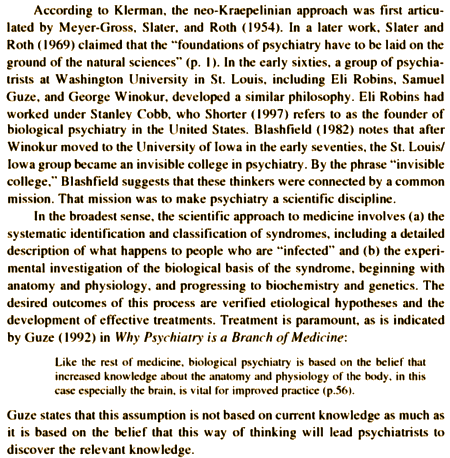1. Psychiatry is a branch of medicine.
2. Psychiatry should utilize modern scientific methodologies and base its practice on scientific knowledge.
3. Psychiatry treats people who are sick and who require treatment.
4. There is a boundary between the normal and the sick.
5. There are discrete mental illnesses. They are not myths, and there are many of them.
6. The focus of psychiatric physicians should be on the biological aspects of illness.
7. There should be an explicit and intentional concern with diagnosis and classification.
8. Diagnostic criteria should be codified, and a legitimate and valued area of research should be to validate them.
9. Statistical techniques should be used to improve reliability and validity.

A year and a half after the publication of the DSM-III, Spitzer began work on its revision. Emboldened by his success, he became still more adamant about his opinions, and made enemies of a variety of groups. “I love controversy,” Spitzer admits, “so if there was something that I thought needed to be added that was controversial, so much the better”… “A lot of what’s in the DSM represents what Bob thinks is right,” Michael First, a psychiatrist at Columbia who worked on both the DSM-IIIR and DSM-IV, says. “He really saw this as his book, and if he thought it was right he would push very hard to get it in that way.” Thus, despite the success of Spitzer’s two editions, and despite extensive lobbying on his part, the American Psychiatric Association gave the chairmanship of the DSM-IV task force to Allen Frances. “The American Psychiatric Association decided that they had had enough of Spitzer, and I can understand that,” Spitzer says with a note of regret in his voice. “I think that there was a feeling that if the DSM was going to represent the entire profession—which obviously it has to—it would be good to have someone else.” This certainly was part of the reason. But Spitzer’s colleagues believe that the single-mindedness with which he transformed the DSM also contributed to his eclipse. “I think that Spitzer looked better in III than he did in IIIR,” Peele says. “IIIR, for one reason or another, came across as more heavy-handed—‘Spitzer wants it this way!’ ”
I’m not the person to be considered an expert on what was in the minds of the group centered in Saint Louis known as the neo-Kraepelinians. But here’s how I think it they thought about things. Emil Kraepelin had been a pioneer in beginning a medical classification of psychiatric disease by partitioning insanity into Manic-Depressive Illness and Schizophrenia [Dementia Praecox]. They thought that Sigmund Freud came along and got psychiatry off-track with his metapsychological theories – blurring the boundaries between health and sickness, and deviating from the medical model of disease. Their goal was to return psychiatry to Kraepelin’s focus on biology, the traditional domain of medicine. If put back on the correct medical/biological path, they presumed that psychiatry could move forward. The way to begin that process was through objective classification and diagnosis. The rewards would come in the resulting future discoveries:

A strong part of the case made by the the neoKraepelinians could be called "the emperor has no clothes" argument – repeated examples of situations where costly psychoanalytically based treatments had failed to achieve results. It was in the time of paradigm exhaustion for psychoanalysis so there were plenty of examples to choose from. But they were not yet in the position to offer a lot of successes themselves and had to content themselves with the conviction that reconnecting psychiatry with biological medicine would lead to future results. Without effective treatments of their own, they were vulnerable to the same criticism they leveled at the psychoanalysts.
While Spitzer was not a part of the Saint Louis group, he had drifted into the neo-Kraepelinian camp and was focused on Affective Disorders. He had been involved in the drafting of the DSM-II in 1968. In 1972, the was part of a US/UK task force on psychiatric diagnosis – the group that found that American psychiatrists diagnosed Affective Disorder much less often that British psychiatrists. In 1975, he developed research criteria for Affective Disorders. And one has to agree that his DSM-III was true to the neoKraepelinian model, at least 1. through 7. of Klerman’s 1978 standard above [As I’ve said previously, I don’t personally find the DSM-III to be that Kraepelinian/medical, but I’m going to go with their way of thinking about it for the moment]. I accept on faith that Spitzer was not under the influence of the pharmaceutical industry himself.
Their argument implies that people who do not have a biological basis for their mental symptoms are not in the domain of psychiatry, and further that the Freudians were treating people who were not medically ill, and worse, were doing it on the medical dollar from third party payers. In another context, I might mount an argument with some [but not all] of that formulation, but that’s not my current focus. What I’m interested in right now is in more contemporary issues:
• How did a movement with such a clear statement of scientific intent lead us here – to an unholy alliance with the pharmaceutical industry and so much corrupted and/or marginal science?
• What part did Robert Spitzer’s DSM-III play in the development of this now more than obvious dark side to modern psychiatry?
Now those are some really big questions, certainly a lot bigger than a simple post on a little blog floating in the Internet Sea – bigger than some retired psychiatrist/psychoanalyst like me whose only credentials are an n=1 career in the time of change and a curiosity about how it has all played out. Sometimes, the best you can do is ask a question rather than provide the answer. But I do have some observation to make prior to trying to speculate about the answers.
• The release of the DSM-III and the coming of the pharmaceutical industry were closely linked in time. Whether Spitzer’s DSM-III committee knew that would happen, or wanted it to happen, or it was an incidental planetary alignment might be questioned, but that they arrived as a matched pair on the academic psychiatry scene is simply a fact.
• The "emperor has no clothes" argument was the monotonous refrain in those early days of the coming of the new wave of psychiatrists. A vignette:
Our new chairman asked me to join him in a presentation at the summer meeting of our state association about anorexia/bulemia, a hot topic following the death of Karen Carpenter. I was no expert on the topic, but like anyone practicing on a university campus, I’d seen a number of the cases that came out of the woodwork when she died and had done some reading. I talked about the challenges of feminine identity formation in adolescence and gave a lot of case examples. It was actually pretty good. He stood up and complimented me on the presentation, and then asked how did we know that they weren’t vomiting because their CSF dopamine levels were low? And then went off on evidenced-based medicine, or at least the back-then version. Over the months, I watched him do that over and over again. Get some dynamic psychiatrist or analyst to present something, the go neoKraepelinian in response.
At the time, I didn’t get it. I kept waiting around for something other than negation, like what did he think about anything. It never came. The point in the moment was to negate whatever we speculators had to say. But I didn’t know that at the time. Once I figured it out, I took my straw-man self and exited stage left. I get it now, but back then it was a mystery to me. It just seemed kind of like a low blow.
• I think my recurrent complaint about the endless presentations about the brave new worlds of the future, the emerging this, the advances in that, the novel approaches to something-or-another make more sense to me now. If you’re going to shoot down what came before and bank on the successes of the future, sooner or later, you need to produce some solid results. Until those future effective treatments arrive, you’ve got to keep the promises alive.
How all of that fits with the dark side seems to me worth thinking about some more…


 A strong part of the case made by the the neoKraepelinians could be called "the emperor has no clothes" argument – repeated examples of situations where costly psychoanalytically based treatments had failed to achieve results. It was in the time of paradigm exhaustion for psychoanalysis so there were plenty of examples to choose from. But they were not yet in the position to offer a lot of successes themselves and had to content themselves with the conviction that reconnecting psychiatry with biological medicine would lead to future results. Without effective treatments of their own, they were vulnerable to the same criticism they leveled at the psychoanalysts.
A strong part of the case made by the the neoKraepelinians could be called "the emperor has no clothes" argument – repeated examples of situations where costly psychoanalytically based treatments had failed to achieve results. It was in the time of paradigm exhaustion for psychoanalysis so there were plenty of examples to choose from. But they were not yet in the position to offer a lot of successes themselves and had to content themselves with the conviction that reconnecting psychiatry with biological medicine would lead to future results. Without effective treatments of their own, they were vulnerable to the same criticism they leveled at the psychoanalysts.
I wish you would publish a book. Please. I’ll buy it.
Me too…